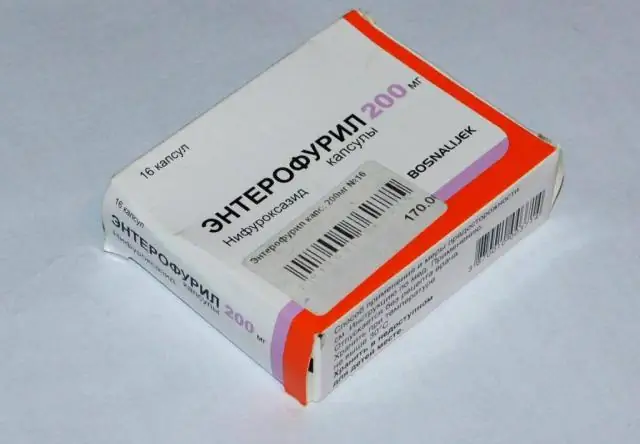- Author Rachel Wainwright wainwright@abchealthonline.com.
- Public 2023-12-15 07:39.
- Last modified 2025-11-02 20:14.
Xenical
Xenical: instructions for use and reviews
- 1. Release form and composition
- 2. Pharmacological properties
- 3. Indications for use
- 4. Contraindications
- 5. Method of application and dosage
- 6. Side effects
- 7. Overdose
- 8. Special instructions
- 9. Application during pregnancy and lactation
- 10. Drug interactions
- 11. Analogs
- 12. Terms and conditions of storage
- 13. Terms of dispensing from pharmacies
- 14. Reviews
- 15. Price in pharmacies
Latin name: Xenical
ATX code: A08AB01
Active ingredient: Orlistat (Orlistat)
Manufacturer: F. Hoffmann-La Roche Ltd, Switzerland
Description and photo update: 2019-12-08
Prices in pharmacies: from 919 rubles.
Buy

Xenical is an inhibitor of gastrointestinal lipases, an agent for the treatment of obesity.
Release form and composition
Dosage form - capsules: No. 1, gelatinous, turquoise, with a solid opaque structure and black inscription: on the XENICAL 120 case, on the ROCHE cap; inside the capsules - almost white or white pellets (21 pcs. in blisters, in a cardboard box 1, 2 or 4 blisters).
The active substance of Xenical is orlistat, in 1 capsule - 120 mg.
Excipients: talc.
Auxiliary components of pellets: sodium carboxymethyl starch (primogel), microcrystalline cellulose, sodium lauryl sulfate, povidone K-30.
The composition of the capsule shell: indigo carmine, gelatin, titanium dioxide.
Pharmacological properties
Pharmacodynamics
Xenical is a specific, potent and reversible inhibitor of gastrointestinal lipases with a prolonged effect. Its therapeutic effect is carried out in the lumen of the small intestine and stomach and consists in the formation of a covalent bond with the active serine site of pancreatic and gastric lipases. In this case, the inactivated enzyme loses the ability to break down fats supplied with food in the form of triglycerides into monoglycerides and absorbed free fatty acids. Since triglycerides that have not been destroyed in the body are not absorbed, fewer calories enter the body, which leads to a decrease in body weight. In addition, the therapeutic effect of Xenical is realized without the entry of its components into the systemic circulation.
Faecal fat data indicate that orlistat is effective 24-48 hours after ingestion. Cancellation of the drug leads to a decrease in the concentration of fat in the feces to the level registered before the start of treatment in 48-72 hours.
Clinical studies of patients taking Xenical prove that they have more significant weight loss compared to patients who are prescribed diet therapy. A decrease in body weight was noted already during the first 2 weeks after the start of therapy and lasted 6-12 months even in patients who responded negatively to diet therapy. Over the course of two years, a statistically significant improvement in the profile of metabolic risk factors associated with obesity was recorded. Also, compared with placebo, there was a significant decrease in body fat.
The use of orlistat allows you to prevent re-gaining body weight. Weight gain, amounting to no more than 25% of the lost weight, was observed in about 50% of patients, while the rest retained the body weight they had reached at the time of the end of therapy (sometimes even further decrease was found).
Clinical studies, lasting from 6 months to 1 year, have convincingly proved that in patients with increased body weight or obesity and type 2 diabetes who took Xenical, body weight decreases more significantly than in patients who were prescribed only diet therapy as a treatment … Weight loss occurred mainly due to a decrease in body fat. Before the start of the study, even in patients taking hypoglycemic drugs, glycemic control was insufficient. However, with orlistat treatment, clinically and statistically significant improvements in glycemic control were achieved. Also, therapy led to a decrease in insulin concentration, a decrease in the doses of hypoglycemic drugs and a decrease in insulin resistance.
The results of studies conducted over 4 years confirm that orlistat significantly reduces the risk of developing type 2 diabetes mellitus (by approximately 37% compared with placebo). The degree of reduction in the likelihood of disease occurrence was even more significant in patients with an initial impairment of glucose tolerance (approximately 45%).
A 1-year clinical study conducted in a group of obese pubertal patients clearly demonstrated a decrease in body mass index in adolescents who took orlistat compared with those who received only placebo. Also, in patients taking Xenical, there was a decrease in fat mass and in hip and waist circumference and a significant decrease in diastolic blood pressure compared with the placebo group.
Pharmacokinetics
In patients with both obesity and normal body weight, systemic exposure to Xenical is minimized. A single oral administration of the drug at a dose of 360 mg does not lead to the appearance of unchanged orlistat in the plasma, which indicates that its concentration does not reach the level of 5 ng / ml.
The volume of distribution of orlistat is almost impossible to determine due to poor absorption. In vitro, the compound binds more than 99% to plasma proteins (mainly albumin and lipoproteins). A small amount of orlistat can penetrate the erythrocyte membrane.
Orlistat metabolism occurs mainly in the intestinal wall. Experiments have shown that approximately 42% of the minimum fraction of Xenical undergoing systemic absorption is made up of two major metabolites: M1 (four-membered hydrolyzed lactone ring) and M3 (M1 with a cleaved N-formylleucine segment).
The molecules M1 and M3 include an open β-lactone ring, and they also very slightly inhibit lipase (1000 and 2500 times weaker than orlistat, respectively). These metabolites are considered pharmacologically inactive due to their low inhibitory activity and minimal plasma concentrations (approximately 26 ng / ml and 108 ng / ml, respectively) when Xenical is taken in small doses.
The main route of elimination involves the excretion of non-absorbed orlistat with feces. With the feces, approximately 97% of the taken dose of Xenical is excreted, and about 83% is unchanged. The total renal excretion of all substances whose structure is associated with orlistat is less than 2% of the oral dose. The period of complete elimination of the drug from the body (with urine and faeces) is 3-5 days. The ratio of the ways of excretion of the active component of Xenical in people with normal body weight and obese patients was the same. Orlistat and its metabolites M1 and M3 can also be excreted in the bile. Their plasma concentrations in the treatment of children do not differ from those in adult patients when taking the same doses of the drug. The daily excretion of fat with feces during treatment with Xenical was 27% when taking the drug with food and 7% when taking placebo.
Preclinical data and animal studies have not identified additional risks to patients in terms of safety profile, toxicity, reproductive toxicity, genotoxicity and carcinogenicity. Also, the presence of a teratogenic effect in animals has not been proven, which makes it unlikely in humans.
Indications for use
The use of Xenical is indicated in combination with a moderately low-calorie diet for long-term therapy of obesity or overweight, including in patients with risk factors similar to obesity.
The drug is prescribed to patients with overweight or obesity in the treatment of type 2 diabetes mellitus in combination with hypoglycemic agents: insulin, metformin, sulfonylurea derivatives or a moderately low-calorie diet.
Contraindications
- Cholestasis;
- Chronic malabsorption syndrome;
- The period of pregnancy and breastfeeding;
- Hypersensitivity to drug components.
The safety and efficacy of using the drug in patients with impaired renal and liver function, elderly patients and children under 12 years of age have not been studied.
Instructions for the use of Xenical: method and dosage
Capsules are taken orally, during or immediately (within 1 hour) after a meal.
Recommended dosage: 1 capsule 3 times a day, during each main meal.
If the food does not contain fat or the patient skips breakfast, dinner or lunch, then the daily dose of the drug is also reduced by the number of missed meals.
The patient's balanced, moderately low-calorie diet should contain up to 30% fat. The daily calorie intake, consisting of fats, proteins and carbohydrates, should be divided into three main doses.
Side effects
In clinical studies of the use of Xenical, the following adverse reactions have occurred:
- From the gastrointestinal tract: very often - strong urge to defecate, discharge from the rectum of an oily structure, steatorrhea, gas with slight discharge, increased frequency of bowel movements, loose stools, discomfort or pain in the abdomen, flatulence (frequency increases with increasing fat content in food); often - bloating, soft stools, fecal incontinence, pain or discomfort in the rectum, damage to the teeth and / or gums;
- Others: very often - headache, upper respiratory tract infections, flu; often - weakness, dysmenorrhea, anxiety, infections of the urinary and lower respiratory tract, in patients with type 2 diabetes mellitus - hypoglycemic conditions.
In post-marketing observations, possible cases of side effects are described:
- Allergic reactions: rarely - itching, skin rash, bronchospasm, urticaria, anaphylaxis, angioedema; very rarely, a bullous rash;
- Others: very rarely - increased activity of alkaline phosphatase and transaminases, hepatitis, rectal bleeding, diverticulitis, pancreatitis, cholelithiasis and oxalate nephropathy (frequency of occurrence is unknown).
Overdose
Clinical studies, which involved persons with normal body weight and obese patients who took a single dose of 800 mg or were treated with Xenical for 15 days and received it at a dosage of 400 mg 3 times a day, do not confirm the occurrence of significant adverse events. Also, patients who took orlistat 240 mg 3 times a day for 6 months did not have significant health problems.
Thus, with an overdose of Xenical, undesirable effects are either absent or similar to those registered when using the drug in therapeutic doses. In case of severe drug overdose, it is recommended to monitor the patient's condition for 24 hours. According to animal and human studies, all systemic effects associated with the lipase-inhibiting properties of orlistat are rapidly reversible.
special instructions
According to the instructions, Xenical, with prolonged use, allows you to control the reduction and maintenance of body weight at a new level, preventing the re-gain of extra pounds.
Exceeding the recommended dose of orlistat does not enhance its therapeutic effect.
The clinical effect of the drug reduces the amount of visceral fat and improves the profile of risk factors and pathologies associated with obesity, including impaired glucose tolerance, type 2 diabetes mellitus, hyperinsulinemia, hypercholesterolemia, arterial hypertension.
Simultaneous administration of the drug with hypoglycemic agents (sulfonylurea derivatives, metformin, insulin) and adherence to a moderately hypocaloric diet allows type 2 diabetes patients with obesity or overweight to further improve the compensation of carbohydrate metabolism.
In most patients, after four years of using orlistat, clinical studies confirm the content of beta-carotene and vitamins A, D, E, K within the normal range. To provide the body with an adequate intake of nutrients, the appointment of multivitamins is indicated.
A moderately hypocaloric diet should be balanced, high in fruits and vegetables, and 30% or less in calories as fat. The daily intake of carbohydrates, fats and proteins should be eaten in three main meals.
The likelihood of side effects of the drug from the gastrointestinal tract increases with a background of food rich in fats.
The use of Xenical in type 2 diabetes mellitus improves the compensation of carbohydrate metabolism and may cause the need to reduce the dose of hypoglycemic agents.
Application during pregnancy and lactation
Reproductive toxicity studies conducted on animals did not reveal the teratogenic and embryotoxic effects of Xenical. It is assumed that the drug is safe for pregnant women, however, due to the lack of clinically confirmed data, its administration during this period is not recommended. It is not known for sure whether orlistat passes into breast milk, so breastfeeding should be discontinued during treatment.
Drug interactions
There was no clinical interaction of Xenical with the simultaneous use of amitriptyline, atorvastatin, biguanides, digoxin, fibrates, fluoxetine, losartan, phenytoin, oral contraceptives, phentermine, pravastatin, warfarin, nifedipine of the gastrointestinal system with the use of medication with medication and nifedipine release with medication with medication release. However, when combined with oral anticoagulants, including warfarin, it is recommended to monitor the international normalized ratio (INR).
There is a decrease in the absorption of beta-carotene and vitamins D, E, so multivitamins should be taken before bedtime or 2 hours after taking the drug.
The combination with cyclosporine can lead to a decrease in its concentration in the blood plasma, therefore, it is necessary to regularly determine the plasma content of cyclosporine when combined with orlistat.
Due to the lack of results of pharmacokinetic studies, the simultaneous use of acarbose is contraindicated.
Against the background of the simultaneous administration of Xenical and antiepileptic drugs, cases of seizures in the patient were recorded. Since the causal relationship of this interaction has not been established, the frequency and / or severity of convulsive syndrome in this category of patients should be monitored.
Analogs
Xenical analogs are: Xsenalten, Orsoten, Orsoten Slim, Orlistat Canon, Alli, Orlimax.
Terms and conditions of storage
Store in a dry place out of reach of children at temperatures up to 25 ° C.
The shelf life is 3 years.
Terms of dispensing from pharmacies
Dispensed by prescription.
Reviews about Xenical
According to reviews, Xenical causes controversy in patients. Most of them claim that its use will be effective only in the case of a comprehensive fight against the problem of excess weight.
Many doctors consider the drug to be a good aid in the treatment of obesity, but it must be taken in conjunction with a low-fat diet. Within 1 month of treatment with Xenical, even without significant strength and physical exertion, you can lose weight by 1.5-2 kg. Even better results are achieved by combining such drug therapy with sports.
Depending on the individual characteristics of the organism and the careful observance of the doctor's prescriptions, it is possible to reduce body weight by 10-15 kg in 3 months, and by 30 kg in 6 months.
Price for Xenical in pharmacies
The price of Xenical for a package, which includes 21 capsules, is 1140-1270 rubles. A package of the drug containing 42 capsules can be purchased for 2,070-2,300 rubles, and a package containing 84 capsules for 3800-4200 rubles.
Xenical: prices in online pharmacies
|
Drug name Price Pharmacy |
|
Xenical 120 mg capsules 21 pcs. RUB 919 Buy |
|
Xenical 120 mg capsules 42 pcs. 1728 RUB Buy |
|
Xenical 120 mg capsules 84 pcs. RUB 3029 Buy |

Maria Kulkes Medical journalist About the author
Education: First Moscow State Medical University named after I. M. Sechenov, specialty "General Medicine".
Information about the drug is generalized, provided for informational purposes only and does not replace the official instructions. Self-medication is hazardous to health!






